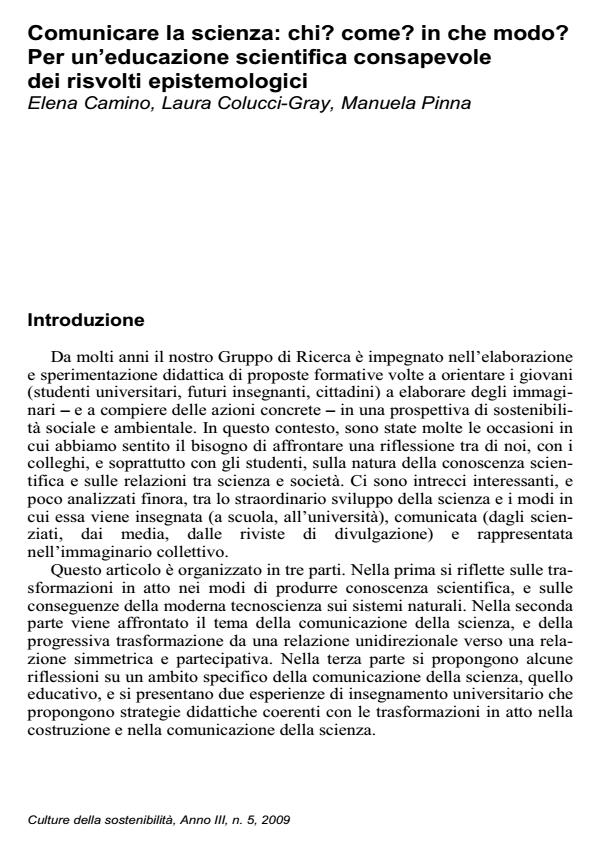Comunicare la scienza: chi? come? in che modo? Per un’educazione scientifica consapevole dei risvolti epistemologici
Titolo Rivista CULTURE DELLA SOSTENIBILITA '
Autori/Curatori Elena Camino, Laura Colucci-Gray, Manuela Pinna
Anno di pubblicazione 2009 Fascicolo 2009/5 Lingua Italiano
Numero pagine 22 P. 9-30 Dimensione file 156 KB
DOI 10.3280/CDS2009-005002
Il DOI è il codice a barre della proprietà intellettuale: per saperne di più
clicca qui
Qui sotto puoi vedere in anteprima la prima pagina di questo articolo.
Se questo articolo ti interessa, lo puoi acquistare (e scaricare in formato pdf) seguendo le facili indicazioni per acquistare il download credit. Acquista Download Credits per scaricare questo Articolo in formato PDF

FrancoAngeli è membro della Publishers International Linking Association, Inc (PILA)associazione indipendente e non profit per facilitare (attraverso i servizi tecnologici implementati da CrossRef.org) l’accesso degli studiosi ai contenuti digitali nelle pubblicazioni professionali e scientifiche
Comunicare la scienza: chi? come? in che modo? Per un’educazione scientifica consapevole dei risvolti epistemologici - In the last twenty years, we have witnessed a rapid transformation of the practices of science: the availability of tools of increasing power, the presence of private investments and financial support, the increasing and sometimes unforeseen transformations of natural systems following technological applications of scientific knowledge, have produced new situations that are of great relevance for society. The complexity of the interactions between humans and nature becomes manifest through the appearance of unexpected phenomena and processes: in order to cope with this situation precautionary attitudes have to be taken, and control procedures of scientific activity have to be implemented. This implies a process of democratization of science, and an increasing involvement of citizens in the production of new knowledge. Education has a role of primary importance and responsibility in promoting, in young people, an idea of science that is more commensurate with our times and the problems that humanity is facing. It is no longer suitable and viable to present science as a neutral and objective activity, and to leave scientists with the responsibility to make crucial choices. Teachers are charged with the task of presenting science as a human, fallible endeavour, loaded with interests and values. This new scenario of science calls more and more for the contribution of a multiplicity of perspectives as a precondition for democratic governance.;
Elena Camino, Laura Colucci-Gray, Manuela Pinna, Comunicare la scienza: chi? come? in che modo? Per un’educazione scientifica consapevole dei risvolti epistemologici in "CULTURE DELLA SOSTENIBILITA '" 5/2009, pp 9-30, DOI: 10.3280/CDS2009-005002